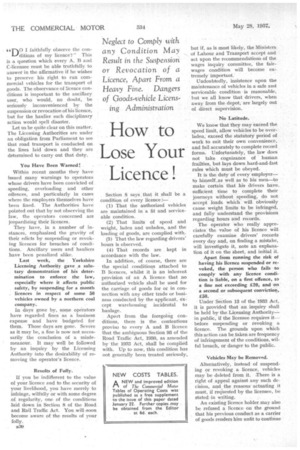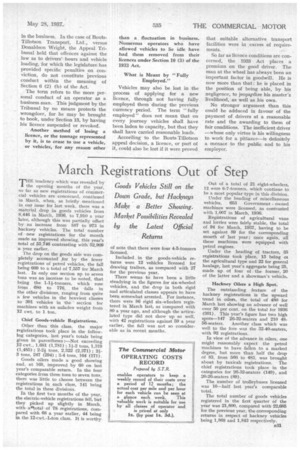How to Lose Your Licence!
Page 44

Page 45

If you've noticed an error in this article please click here to report it so we can fix it.
Neglect to Comply with any Condition May Result in the Suspension or Revocation of a Licence, Apart From a Heavy Fine. Dangers of Goods-vehicle Licens
ing Administration
1 faithfully observe the con
ditions of my licence?' This is a question which every A, B and C-licensee must be able truthfully to answer in the affirmative if he wishes to preserve his right to run commercial vehicles for the transport of goods. The observance of licence conditions is important to the ancillary user, who would, no doubt, be seriously inconvenienced by the suspension or revocation of his licence, but for the haulier such disciplinary action would spell disaster.
Let us be quite clear on this matter. The Licensing Authorities are under an obligation from Parliament to see that road transport is conducted on the lines laid down and they are determined to carry out that duty.
You Have Been Warned; Within recent months they have issued many warnings to operators whose drivers have been convicted of speeding, overloading and other offences, and particularly in cases where the employers themselves have been fined. The Authorities have pointed out that by not observing the law, the operators concerned are jeopardizing their licences.
They have, in a number of instances, emphasized the gravity of their edicts by suspending or revoking licences for breaches of conditions. Ancillary users and hauliers have been penalized alike.
Last week, the Yorkshire Licensing Authority gave a salutary demonstration of his determination to enforce the law, especially where it affects public safety, by suspending for a month licences in respect of some 50 vehicles owned by a northern coal company.
In days gone by, some operators have regarded fines as a business expense and have budgeted for them. Those days are gone. Severe as it may be, a fine is now not neces sarily the conclusion of a misdemeanour. It may well be followed by an inquiry by the Licensing Authority into the desirability of removing the operator's licence.
Results of Folly.
If you be indifferent to the value of your licence and to the security of your livelihood, you have merely to infringe,. wilfully or with some degree of regularity, one of the conditions laid down in Section 8 of the Road and Rail Traffic Act. You will .soon become aware of the results of your folly.
630 Section 8 says that it shall be a condition of every licence :— (1) That the authorized vehicles are maintained in a fit and serviceable condition.
(2) That limits of speed and weight, laden and unladen, and the loading of goods, are complied with.
(3) That the law regarding drivers' hours is observed.
(4) That records are kept in accordance with the law.
In addition, of course, there are the special conditions attached to B licences, whilst it is an inherent provision of an A licence that no authorized vehicle shall be used for the carriage of goods for or in connection with any other trade or business conducted by the applicant, except warehousing incidental to haulage.
Apart from the foregoing conditions, there is the contentious proviso to every A and B licence that the ambiguous Section 93 of the Road Traffic Act, 1930, as amended by• the 1933 Act, shall be complied with. Up to now, this condition has not generally been treated seriously, but if, as is most likely, the Ministers of Labour and Transport accept and act upon the recommendations of the wages inquiry committee, the fairwages condition will become extremely important.
Undoubtedly, insistence upon the maintenance of vehicles in a safe and serviceable condition is reasonable, but we all know that drivers, when away from the depot, are largely out of direct supervision.
No Latitude.
We know that they may exceed the speed limit, allow vehicles to be overladen, exceed the statutory period of work to suit their own convenience, and fail accurately to complete record forms. Unfortunately, the law does not take cognizance of human frailties, but lays down hard-and-fast rules which must be obeyed.
It is the duty of every employer— to himself, .as well as to his men—to make certain that his drivers have. sufficient time to complete their journeys without speeding, do not accept loads which will obviously cause weight limits to be infringed, and fully understand the provisions regarding hours and records.
The operator who really appreciates the value of his licence will carefully examine drivers' records every day and, on finding a mistake, will investigate it, note an explanation of it on the sheet, and initial it.
Apart from running the risk of having his licence suspended or revoked, the person who fails to comply with any licence condition is liable, on a first offence, to a fine not exceeding £20, and on a second or subsequent conviction, £50.
Under Section 13 of the 1933 Act, it is provided that an inquiry shallbe held by the Licensing Authority— in public, if the licensee requires it--before suspending or revoking a licence. The grounds upon which this action can be taken are frequency of infringement of the conditions, wilful breach, or danger to the public.
Vehicles May be Removed.
Alternatively, instead of suspending or revoking a licence, vehicles may be deleted from it. There is a right of appeal against any such decision, and, the reasons actuating it must, if requested by the licensee, be stated in writing.
An existing licence holder may also be refused a licence on the ground that his previous conduct as a carrier of goods renders him unfit to continue in the business. In the case of BoutsTillotson Transport, Ltd., versus Donaldson Wright, the Appeal Tribunal held that offences against the law as to drivers' hours and vehicle loading, for which the legislature has provided specific penalties on conviction, do not constitute previous conduct within the meaning of Section 6 (2) (b) of the Act.
The term refers to the more personal conduct of an operator as a business man. This judgment by the Tribunal by no means protects the wrongdoer, for he may be brought to book, under Section 13, by having his licence suspended or revoked. Another method of losing a licence, or the tonnage represented by it, is to cease to use a vehicle, or vehicles, for any reason other than a fluctuation in business. Numerous operators who have allowed vehicles to lie idle have had them removed from their licences under Section 10 (3) of the 1933 Act.
What is Meant by "Fully Employed."
Vehicles may also be lost in the process of applying for a new licence, through not having fully employed them during the previous currency period. The term " fully employed" does not mean that on every journey vehicles shall have been laden to capacity, but that they shall have carried reasonable loads.
According to the Bouts-Tillotson appeal decision, a licence, or part of it, could also be lost if it were proved that suitable alternative transport facilities were in excess of requirements.
So far as licence conditions are concerned, the 1933 Act places a premium on the good driver. The man at the wheel has always been an important factor in goodwill. He is now more than that: he is placed in the position of being able, by his negligence, to jeopaidize his master's livelihood, as well as his own.
No stronger argument than this could be adduced in favour of the payment of drivers at a reasonable rate and the awarding to them of fair conditions. The inefficient driver —whose only virtue is his willingness to work for a pittance—is definitely a menace to the public and to his employer.




























































































